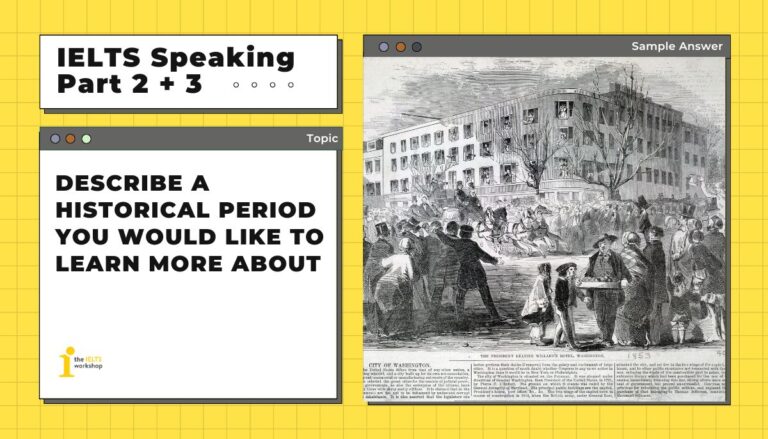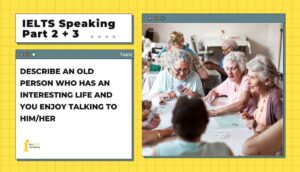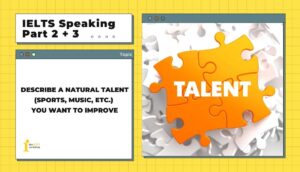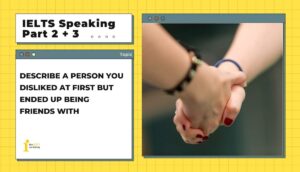Tại bài giải mẫu IELTS Speaking lần này, cô Khánh Huyền và cô Mai Linh của The IELTS Workshop sẽ hướng dẫn bạn trả lời một số câu hỏi của chủ đề Describe a historical moment you would like to learn more about trong IELTS Speaking Part 2 & 3. Cùng tham khảo sample, từ vựng và một vài cách diễn đạt ghi điểm trong phần thi IELTS Speaking nhé.
Part 2: Describe a historical moment you would like to learn more about
Describe a historical moment you would like to learn more about
You should say:
What you are interested in
When it happened
What you know about it
And why you would like to learn more
Dưới đây là bài mẫu cho topic “Describe a historical moment you would like to learn more about“.
1. Bài mẫu 1 (Sample)
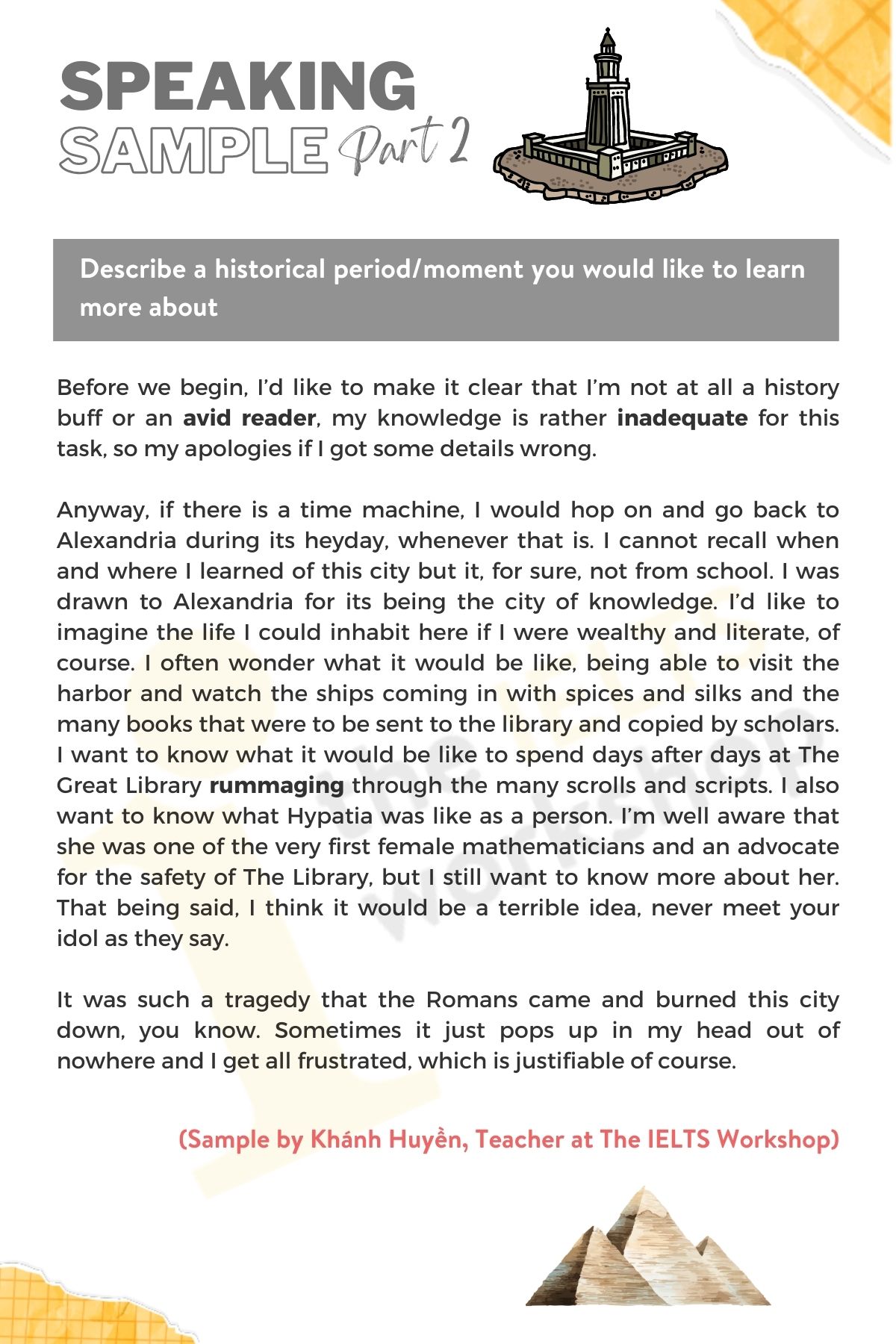
Từ vựng (Vocabulary)
- avid reader: ham đọc sách
- inadequate: không thỏa đáng
- rummaging: lục lọi
2. Bài mẫu 2 (Sample)
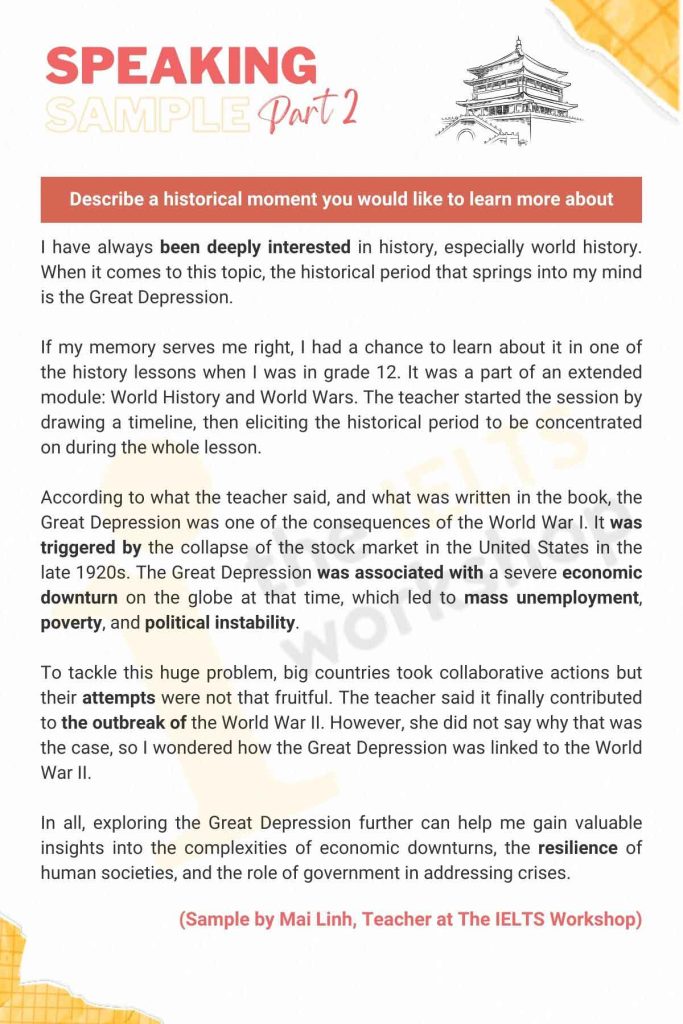
Từ vựng (Vocabulary)
- Be deeply interested in sth (adj)
- Be triggered by (v) (trận chiến) được châm ngòi bởi …
- Be associated with (v) có liên hệ với, liên quan tới, gắn liền với
- Economic downturn (n) suy thoái kinh tế
- Mass unemployment (n) thất nghiệp hàng loạt
- Poverty (n) nạn nghèo
- Political unstability (n) (sự) bất ổn chính trị
- Attempt (n) nỗ lực
- The outbreak of (a war) (n) sự bùng nổ (chiến tranh)
- Resilience (n) sự dẻo dai
Part 3: History
Bên cạnh Part 2, bạn hãy tham khảo thêm Part 3 cho chủ đề này nhé
1. Should everyone know history?
2. In what ways can children learn history?
3. What are the differences between learning history from books and from videos?
4. Is it difficult to protect and preserve historic buildings?
5. Who should be responsible for protecting historic buildings?
6. Who should pay for the preservation of historic buildings?

1. Should everyone know history?
Sample 1: I don’t see how this is even a question. I mean, of course we should.
There’s a saying, “Those who do not learn history are doomed to repeat it.” So it goes without saying that people should learn history. And more importantly, I may add, is that people should have the opportunity to do so. There is an array of approaches, even historical pieces can help.
- historical pieces: phim sử thi, cổ trang
Sample 2: Definitely. History offers great insights into what happened in the past and how our ancestors led their life centuries ago, so we can gain lots of practical experience from them. Besides, studying history allows us to explain what is happening in the present. For example, the world is divided into two political regimes, one being operated on capitalism and the other following socialism. The explanation to this division can only be found when we learn history.
- To lead one’s life (v) = live (v) sống
- Political regime (n) chế độ chính trị
2. In what ways can children learn history?
Sample 1: The way I see it, history classes at school are not up for this task. If anything, they even create an aversion to learning about the past. That leaves us with field trips, museum visits and TV shows.
Sample 2: There are several ways in which children can learn history. One of the most common ways is to engage in a history lesson at school where they read textbook and listen to their teacher’s presentation. Another way is to watch movies set in a bygone period as there are lots of scenes featuring life of people centuries ago. But more importantly, children really need to get exposed to their ancestors’ life and what actually happened in the past by traveling to places like heritage and historical sites.
- Bygone period/ bygone era (n) thời kỳ đã qua
- Get exposed to (v) tiếp cận với
- Historical site (n) di tích lịch sử
3. What are the differences between learning history from books and from videos?
Sample 1: I suppose the latter can be more vivid. What I mean is that when you can see the whole showdown on the screen, it leaves an emotional impact, like Neil Amstrong stepping on the moon for the first time, you know.
That being said, with the right narrative, history books can be an awful lot of fun. Take Sapiens by Harari for example, the grip it has on readers was phenomenal, I gotta give it a stamp of approval.
Sample 2: Learning about past events from books and videos are radically different. For one thing, books seem to offer greater insights into the event or the historical period, with more details included while that is often not the case for video. What is offered in videos is typically brief summary of a historical event rather than an in-depth analysis. However, studying history from books can be a rather tedious experience as not many people, especially young children, find books interesting and interactive enough. Videos thus offer a more vivid way to absorb historical understanding.
- Be radically different (adj) khác nhau lớn
- Offer (great) insights into sth (v) cung cấp những hiểu biết sâu sắc (về cái gì đó)
- In-depth analysis (n) phân tích chuyên sâu
4. Is it difficult to protect and preserve historic buildings?
Sample 1: It is unfortunately daunting to protect them. For one, the historical value of certain places are not obvious or even visible to the parties involved. Hence, they are not protected and easily replaced with newer, shinier buildings. This kind of tragedy happened to one of Vietnam’s oldest clothing factories – gone in a blink. Such a shame, it could have made an excellent museum, you know.
Another factor is that the premise is likely to be literally falling apart because of all the wear and tear and it’s nearly impossible to restore the building to its glory days. But then again, if Mozart’s childhood home is still standing strong, I can’t see why it is so hard.
Sample 2: I suppose it’d be quite challenging to preserve buildings of historical importance, because nowadays many of those buildings are open to the public, welcoming their visit to learn more about history. However, a large part of the visitors fail to aware of the value of these structures, and vandalize them as a result. It’s actually hard to see how these people can be stopped, which is quite worrying.
- Vandalize (v) phá hoại
5. Who should be responsible for protecting historic buildings?
Sample 1: Well, the government of course. There should be and there is supposed to be certain liaison between their departments in order to decide which buildings were witness to historical milestones and are worth our effort. From where I am, such projects need inputs from experts of different fields, and who else has enough gravitas to regulate them?
Sample 2: Apparently the government, especially the local ones, should be in charge of looking after ancient buildings, just like other heritage sites. This may include the structures’ maintenance, refurbishment and occasionally, but very importantly, renovation. The public should as well be held responsible for protecting historic buildings by not doing damage to them and financially support their operation via ticket purchase and tax payment.
- Be in charge of sth: chịu trách nhiệm cho (cái gì đó)
- Renovation (n) sự tu sửa
- Do damage to sth (v) gây hư hại cho (cái gì đó)
6. Who should pay for the preservation of historic buildings?
Sample 1: The local authority should be responsible for overseeing the expenditure of restoration and/or refurbishment. After all, they’re allocating their citizens’ hard earned money, paid in taxes. I should hope there’s some philanthropists with a heart of gold who can dig deep into their pockets to fund these programs.
Sample 2: In my opinion, the responsibility for preserving historic buildings often falls on a combination of public and private entities, depending on factors such as ownership, significance, and local regulations. For example, if the building belong to a private business, the owners are typically responsible for their upkeep and maintenance. However, if it is a public building, the citizens should take charge of its operation and preservation fund.
- Upkeep and maintenance (n) (sự) bảo trì
Trên đây là bài mẫu cho chủ đề Describe a historical moment you would like to learn more about trong IELTS Speaking Part 2 và Part 3. Để luyện tập nhuần nhuyễn cho topic History nói riêng và các topic khác trong IELTS Speaking, các bạn có thể đăng ký Mock test 1-1 tại khóa học Bổ trợ Speaking Mentor của The IELTS Workshop.


